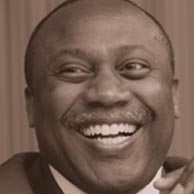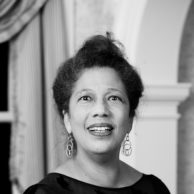IRB Profiles
-

White, Paul T.
Champion of Change—Black Faculty and Staff Association Founder
White,
Paul T.

White, Paul T.
Champion of Change—Black Faculty and Staff Association Founder
The Black Faculty and Staff Association (BFSA) came together, as so many advocacy groups do, over lunch and a conversation. Lunch was at the Polo Grill, then a restaurant across from Homewood Field, and the people who had gathered to talk were black senior staff members concerned about the lack of support for people of color at Johns Hopkins. Toni Moore-Duggan, one of the participants, recalled how that lunch and subsequent discussions among the staff members led to their decision in 1995 to establish the BFSA. “After graduating from Johns Hopkins and while working there, it became evident that there was no voice or forum for black people having difficulties here,” said Moore-Duggan, a certified nurse practitioner who worked at the institution for years. At first, Moore-Duggan said, she and the other staff members were not sure if anyone would buy into efforts to create a forum for people of color, but they did. Seventeen years later, the group is not only going strong but has expanded its mission: to help foster a culture of collaboration by promoting and enhancing the identity and professional welfare and growth of faculty, staff and students through collaborations, community service, education, research and cultural activities. The BFSA has also charged itself with being a crucial resource for the continued success of Johns Hopkins through the development and cultivation of relationships with key leaders of the institution. Paul T. White, assistant dean of admissions at the Johns Hopkins School of Medicine, previously served as associate dean for admissions and financial aid for the School of Medicine and as president of the BFSA. Before joining Johns Hopkins, he held leadership positions in admissions for Yale University, Hamilton College and Colgate University. He earned a law degree from Georgetown University. He said he continues to work in admissions because of the opportunity to “help bring together a class, to shape the institution.”
-

Williams-Glasser, Gail
University cheerleader
Williams-Glasser,
Gail

Williams-Glasser, Gail
University cheerleader
During her senior year at Western High School in Baltimore City, Gail Williams-Glasser wondered if and how she could possibly gain entrance to an elite college. Although her parents opposed and could not afford to bankroll her plans, she found support in a program called Training Now for Tomorrow, designed to encourage academically gifted working-class black students to pursue and succeed in higher education.
With bolstered confidence, honors student Williams-Glasser approached Johns Hopkins University and was quickly enrolled. It was the fall of 1970, the first year that Johns Hopkins began accepting female undergraduates, and among the 90 admitted were five black women: Williams-Glasser, two fellow freshmen, Shirley Dilsworth and Karen Freeman Burdnell, and two transfer students, Lynn Parker and Barbara Wyche.
Although she lived at home during her four years at Johns Hopkins and worked 25 hours a week at Sinai Hospital, Williams-Glasser still found time to join a chemistry club and, with a friend, to establish the university’s first cheerleading squad.
Williams-Glasser serves as the director of compliance and risk management at the League for People with Disabilities. She remains involved with the university as a member of the Johns Hopkins Alumni Association, the Society of Black Alumni, the Johns Hopkins Club and the Frederick Scott Brigade.